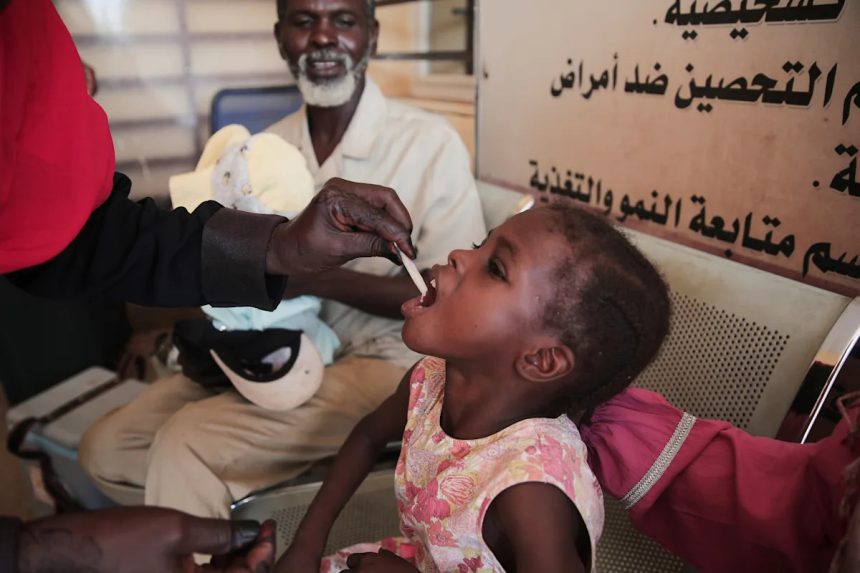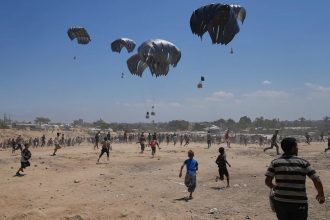PORT SUDAN, Sudan (AP) — Fighting in North Darfur’s embattled capital of el-Fasher has tripled the number of displaced people this year alone in Tawila, a town about 60 kilometers (37 miles) away, said a U.N. migration agency official.
Ugochi Daniels, deputy director general for operations at the International Organization for Migration, IOM, told the Associated Press Thursday that the conflict had also reduced el-Fasher’s own population by 62% this year. She warned that the massive displacement presents major challenges for the country, echoing other aid workers who have repeatedly labeled Sudan the world’s largest displacement crisis.
The recent displacement spike was fueled by intensified fighting in el-Fasher, which has seen a series of attacks in the conflict between the army and rival paramilitaries as they seek to control the city.
The war between the Rapid Support Forces, RSF, and the military began in 2023 when tensions erupted between the two former allies that were meant to oversee a democratic transition after a 2019 uprising.
The fighting has killed at least 40,000 people, according to the World Health Organization, and displaced as many as 12 million others. Over 24 million people are facing acute food insecurity, according to the World Food Program.
“North Darfur remains the epicenter of the crisis here in Sudan and we need peace to be able to access the most difficult places where the needs are the greatest,” said Daniels.
El-Fasher is the military’s last stronghold in the sprawling Darfur region, which has been the epicenter of the violence along with Kordofan.
Daniels explained that it’s hard to provide services for many people who have moved in such a short period of time, especially amid the collapse of health care and other essential services.
‘An active war zone’
The conflict and resultant mass displacement have restricted access to essential services like clean water, proper nutrition, and health care.
Sudan’s Health Minister Haitham Ibrahim told the Associated Press on Wednesday that health care services have been restored in at least 60% of hospitals in areas retaken by the army, including Khartoum.
However, diseases such as cholera, malaria and dengue fever remain rampant amid collapsed health care systems and destroyed infrastructure, particularly water facilities.
Speaking to the AP during the World Health Organization’s annual Regional Committee in Cairo, Ibrahim said that dengue has spread across at least 14 Sudanese provinces. Separately, WHO said late September that 113,629 cholera cases and 3,029 deaths have been recorded across Sudan since the outbreak was declared in July 2024.
Ibrahim said that while cholera significantly increased last year, its spread has now declined to roughly 100 cases a month due to vaccination efforts. To combat dengue and malaria, he said the ministry distributed over 15 million mosquito nets in various areas across the country but could not reach el-Fasher due to difficulty of access.
The minister said the amount of medical aid entering Sudan doesn’t meet the needs of the population because the trucks often get attacked or robbed before they reach communities.
He urged humanitarian organizations and international groups “to break this humanitarian barrier especially in Darfur,” which he described as an “active war zone with RSF presence.”
The minister said health professionals are often unable to expand health campaigns due to lack of funding. While hospitals in Darfur and Khartoum are still intact, they were robbed of equipment and medical resources, especially in the first year of the war, according to Ibrahim, who said total medical losses in Sudan are estimated at around $11 billion.
According to Daniels, only 26% of Sudan’s overall humanitarian response plan has been funded, adding that the IOM’s own required funding stands at just 16% of its goal.
Calling for an end to the misery and suffering endured by the Sudanese people, Daniels emphasized the need for peace and a ceasefire. “There’s no amount of assistance that can bring peace, but if we have peace, we will have access to the people that need assistance,” said Daniels.
____
Khaled reported from Cairo.









